We apologise in advance. It began with a simple question, but this is a bit of a shaggy dog story…Bear with us.
On 2 April, The Sunday Telegraph ran an item about a case in which a child “was taken away from her grandparents and put into foster care after they locked her in her room overnight.” (see here : Child locked locked in bedroom by grandparents is taken into care [sic])
A similar piece appeared in The Times the following day and, in both, John Hemming (former MP) was quoted saying that the grandparents “deserve[d] a written explanation from the judge”. The Telegraph say explicitly about the grandparents “But they have not had a written explanation or seen a judgment so don’t know why the decision was made.”
In the longer Telegraph article John Hemming is quoted extensively :
John Hemming…said that the judge had to “show her working”.
“To not give a reason just isn’t acceptable. If the judge doesn’t have a proper explanation as to why they’re taking the child into care, then they shouldn’t be taking the child into care,” he said.
This is accurate as far as it goes – it IS unacceptable (and an error of law) to fail to give reasons for a judicial decision, which is what John Hemming suggests is what happened. It was also said that “Legal advisers for the couple …had asked the Court of Appeal to re-open the case”.
Although they were not identified as such, these “legal advisers” were caseworkers from Justice for Families, an organisation run by John Hemming himself (although it is now listed as non-trading and its main website is not working, although you can find them on facebook here. They are listed at the ICO office as trading from John Hemming’s former constituency address). JFF do not use lawyers, but effectively operate as McKenzie friends. It is unclear whether or not they are paid but, if they are, it will not be at the expense of the legal aid agency, but at the personal expense of the “client”. Hold in mind as you progress through this post that the person being quoted in the national press is in fact a founder and Director of the organisation which has “asked the Court of Appeal to re-open the case”.
There are several possible reasons why the grandparents might not have seen a written judgment, for example :
- reasons were given orally but the grandparents were not parties to the proceedings and were not entitled to be present, so they didn’t hear them.
- the grandparents were parties to the proceedings but for some reason were not present (through choice, mistake or necessity) to hear the reasons (but then we’d expect their lawyers to pass on the reasons).
- the judge gave reasons orally and no written reasons were produced (but all such decisions are recorded and transcripts can be obtained by the parties for an appeal if they wish) and there is some difficulty with obtaining a transcript (lost recording, administrative mix up, a query over entitlement to a transcript if the grandparents weren’t parties?)
- the judge gave no reasons
We wanted to know which one of these scenarios applied, in particular whether it was suggested that the judge had taken a child away from her family without giving any reasons – because if that was the case it would be really serious and something we would want to highlight. We thought that was unlikely, as the judge is described as a “senior” judge, and it is a cardinal rule that every decision has to be reasoned. It would be a serious failing if a judge had not given any reasons at all. We think that the impression many readers will have got from the articles would be that no reasons were given, even though that is not stated categorically. This is particularly so as the article in the Telegraph cites recent research about the infrequency of publication of judgments, apparently muddling the giving of reasons to the world at large (which happens sometimes) with the giving of reasons privately to those actually involved (which is standard) – but the inclusion of that material without explanation tends to imply some broader lack of openness, of which this specific case is an example.
The unusual nature of the claim was noted by some legal tweeters on 3 April (Day 2) :
@Familoo @martingeorge @BPTC_Lecturer: I rather suspect that the judicial explanation was given in what we lawyers call "a judgment": pic.twitter.com/xX5NcnFUB1
— James Turner QC (@JamesTurner37) April 3, 2017
That was over three weeks ago (incidentally the time limit for bringing an appeal against most final decisions in the Family Court is three weeks). And whilst we’ve been plugging away at this on twitter and via email we are none the wiser. But we have a whole load of new questions that have arisen out of the public discussions with John Hemming.
The thread prompted by James Turner QC got going as follows (@familoo is Lucy Reed, Chair of The Transparency Project) :
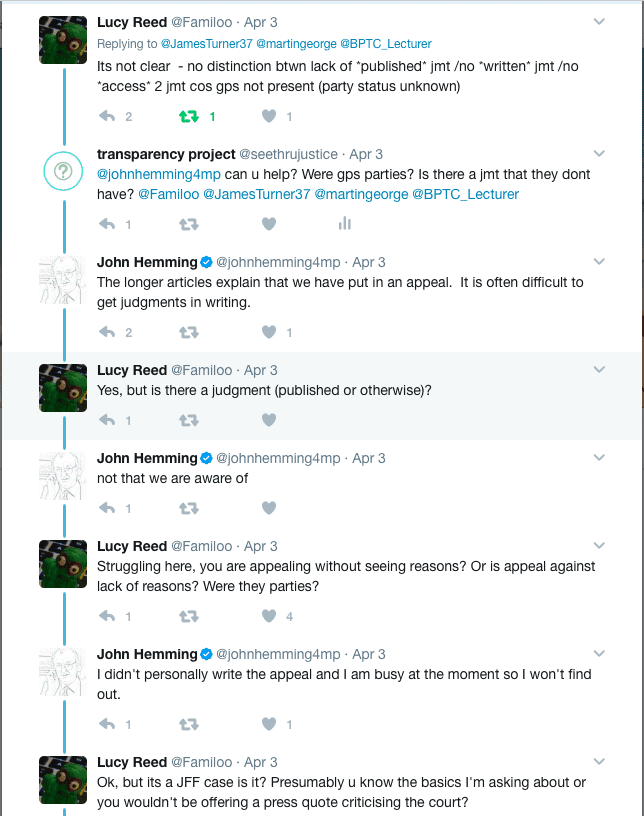
We began to wonder why the head of an organisation responsible for running the appeal in this case would be offering a quote to the press suggesting a grave injustice if he doesn’t even know the basic facts. Some may wonder why the head of that organisation (a campaigner for transparency) didn’t transparently identify himself as such in the article (he blamed that on the journalist choosing not to include it, but our experience is that journalists to whom one offers a quote are quite happy to identify the person quoted with the correct “hat” to suit the quote). We wondered why John Hemming couldn’t just find out the answer, if he didn’t know. And we wondered as well why John Hemming kept answering at all, since the hole he was in was getting bigger by the minute…
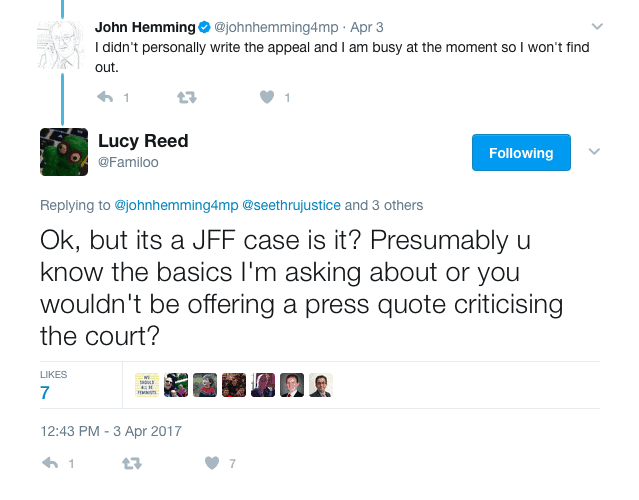
John kept making general points about written judgments, but we couldn’t help but notice his failure to answer what had gone wrong in this particular case….

It went on all day, before John conceded that he didn’t know the answer. Which is pretty extraordinary really. We thought that someone at JFF must know the basis of the appeal that the head of their organisation and unofficial spokesperson had been happy to tell the public that they had lodged with the Court of Appeal. But John didn’t seem to be in a rush to find out. We decided to give it a rest for the day. In fact, we waited 10 days (Day 11) to give John Hemming a proper chance to find out the answer to this question about what it was JFF were arguing had gone wrong in the case vis a vis a failure to provide reasons that warranted an appeal. Sadly, it seems that 10 days was insufficient. Like Captain Oates, Hemming said he might be some time.

Quite so, Julie Doughty (Julie is a trustee of The TP)…No answer to that question yet by the way…
We pressed a bit harder (it’s the 14th by now, Day 13)…
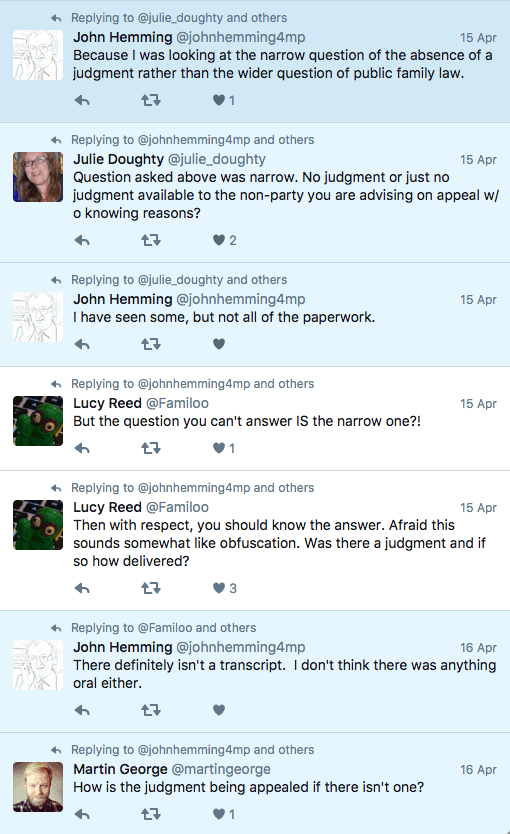
By now (Day 15) we were getting a bit worried that John Hemming didn’t know what he was talking about and was trying to divert attention away from the issue. Only seen some of the paperwork? Definitely no transcript, and he doesn’t think there was anything oral either? This is the work of a moment – send an email to the caseworker or pick up the phone. “Is this really a case where the judge gave no reasons? Can you clarify?” (It is to be hoped and assumed of course that the caseworkers would readily have the answer to hand, because if they did not, one would have to seriously wonder how competent the appeal that they had lodged might be). But then a man too busy to check such a basic point before huffing to the press about the injustice of the case is self-evidently also too busy to check it after the fact. We are now, by the way, some 15 days after John Hemming was first quoted on this specific case, and 14 days after numerous concerned professionals began asking him questions about what was behind his allegations…And at least two weeks into the 3 week appeal period, by which point one would normally expect “legal advisers” to have a tiny bit of a clue.
We asked again, offering some helpful prompts to see if this would produce a eureka moment :
U r quoted saying re this case: “To not give a reason just isn’t acceptable.” But you aren’t even sure there was a failure to give reasons?
You seemed quite clear in your criticism in the article, less so now?
And if a transcript wasnt ordered at the time presumably JFF arranged for one to be obtained as 1st step in launching any appeal?…
…so it’s perplexing if there is still no transcript. Is it cos none ordered, recording lost, or no reasons given at all (or s’thg else)?
(series of tweets by @familoo – see here)
This all prompted others to describe the whole affair as a “farrago” (@bptc_lecturer) and Hemming’s “efforts to avoid the question are like a clown walking across a minefield” (@barristersecret).
Others have asked if the decision was an interim or final decision…. no answer.
Finally, after much ribbing from a number of incredulous tweeters, and the observation from James Turner QC that “he who seeks transparency is not being very transparent about the underlying position”, some news…On 18 April…(Day 17)
Don’t get excited though. It’s complicated you see. And there are very important things intervening…
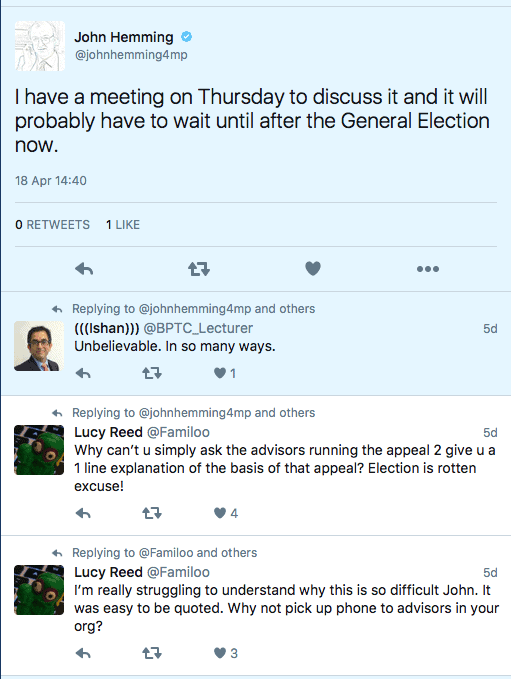
Damn that General Election – just as we were getting somewhere…Everyone was getting a bit tired and emotional by this stage. I observed that Hemming appeared too busy to check his facts or answer our questions, but had a surprising amount of time on his hands to tweet us non-answers and diversions…
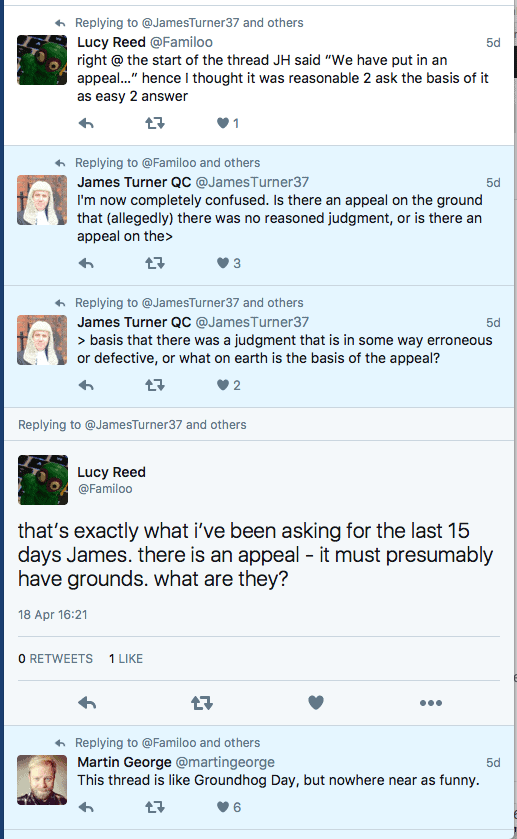
We just wanted Hemming to check what the grounds of appeal said – remember that appeal that he said had been lodged before all this started? The document designed to pithily set out the written reasons for the appeal? Much in the same way that a judge must give written reasons, so that people can easily check it, grounds of appeal would be a written answer to the question we’d all been anxious to have answered for now over two weeks (Day 17). Or so we thought. But John Hemming was too busy to worry about “confused lawyers”. Silly us.
To keep us all entertained in our endless despair someone helpfully introduced the disturbing mental image of the dance of the seven veils, taken up enthusiastically by Hemming himself on Day 18…
“Patience, patience. I did not myself do the appeal. Hence I don’t have the paperwork. It is quite easy really. Now for the dance.”
And indeed, we did begin to wonder whether or not we were being hypnotised by some sort of weird strip tease…The words of Hotel California began whirring round in our minds…“You can check out ask a question any time you like but you can never leave get a straight answer…” Because having been told that we would have to wait until after the GE on 8 June, the tantalising prospect of an answer on Thursday was waved before us before being cruelly whipped away…

On 20 April (Day 19), Hemming said “we are getting on with collating info”. This was confusing. Collating what info? Are they only now putting the appeal together? If so, this seems a very topsy turvy way to run things. Press comment first, facts later.
And then finally, on Day 19 confirmation that THE MEETING has happened. And a private invitation :

Confirming the article “as written” doesn’t help since the whole thread arose from the fact that we “confused lawyers” didn’t understand what it was driving at on day 1 or any subsequent day since. So we have emailed (Day 19). Our full queries are set out below at the foot of this post. We had a response the same day, but suffice to say that we have nothing like answers to our very simple questions or our more detailed breakdown of questions as requested by Mr Hemming. And in fact we have a whole new set of questions arising from what he’s told us… Mr Hemming reiterates that he stands by his comments, but provided us with information that he requested us not to publish until he is 100% certain of his ground and until he has read all of the paperwork. That he wasn’t 100% sure before going to the press was bad enough, but that he remains uncertain by Day 19 is frankly, shocking.
 Having drafted this blog post, a further flurry of tweets was prompted by a passer-by on twitter asking for an update this morning (Day 23), as a result of which Mr Hemming has agreed we may publish his responses. He asserts that they answer our queries. We disagree. It is disappointing to note that Mr Hemming feels he is merely humouring us by engaging with our enquiries, and that he doesn’t have to answer our queries at all. We think that if a spokesperson for an organisation making serious assertions about the conduct of a case is not prepared to be asked questions about them or is unable to give clear answers backing up their assertion its a pretty rum do. We are not sure whether to be more concerned about the fact that Mr Hemming’s email may have errors in it or the fact that Mr Hemming is happy to acknowledge that he is not fully on top of his case, without appearing to see that this itself reflects badly upon him and the organisation advising the grandparents in this case.
Having drafted this blog post, a further flurry of tweets was prompted by a passer-by on twitter asking for an update this morning (Day 23), as a result of which Mr Hemming has agreed we may publish his responses. He asserts that they answer our queries. We disagree. It is disappointing to note that Mr Hemming feels he is merely humouring us by engaging with our enquiries, and that he doesn’t have to answer our queries at all. We think that if a spokesperson for an organisation making serious assertions about the conduct of a case is not prepared to be asked questions about them or is unable to give clear answers backing up their assertion its a pretty rum do. We are not sure whether to be more concerned about the fact that Mr Hemming’s email may have errors in it or the fact that Mr Hemming is happy to acknowledge that he is not fully on top of his case, without appearing to see that this itself reflects badly upon him and the organisation advising the grandparents in this case.

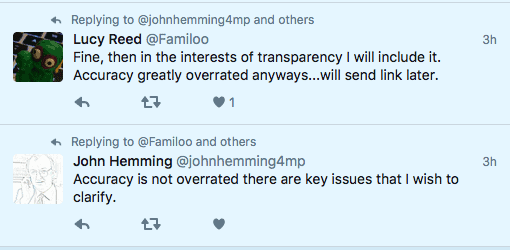 Anyway, here are the answers that John Hemming has provided us with. We’ve edited slightly where necessary to be sure we are not contravening any rules around anonymity/privacy. Those with sufficient stamina can compare and contrast the replies to the questions we posed at the foot of the post.
Anyway, here are the answers that John Hemming has provided us with. We’ve edited slightly where necessary to be sure we are not contravening any rules around anonymity/privacy. Those with sufficient stamina can compare and contrast the replies to the questions we posed at the foot of the post.
John Hemming’s email reply (Day 19)
The understanding I have is that the [grandparents] had the child on an SGO [Special Guardianship Order] hence were clearly parties. As I understand it they agreed the facts of the threshold, but neither that the threshold was passed nor a care order or care plan. The judge treated agreeing the facts of the threshold as consent and therefore did not produce a judgment explaining why those facts were sufficient to satisfy either the 89 Act or indeed Article 8 ECHR (“necessary”).
Clearly there should be a judgment. However, I do not want to make a public statement as to precisely what happened until I have reviewed all of the paperwork which I have not as yet. That is because given the interest in this I don’t want to get anything even slightly wrong.
I think that is a good starting position. However, I would ask that you wait until I have reviewed the paperwork to give you a full answer.
From the perspective of the grandparents no-one has explained why what they did (which is not contested) was sufficient for their grandchild to be removed from their care. (hence a judgment).
The above is my best understanding of the case, but please accept that I have not read all the paperwork as yet…
The legal question is one as to whether agreeing facts is consent to a care order. I don’t personally think that is true and I would think you would agree with me.
Our response the same day (from Lucy Reed) was as follows :
I agree, that agreeing threshold is crossed is not the same as agreeing a public law order should be made. Not at all. The one does not necessarily follow from the other. I’ve dealt with many cases where I’ve conceded threshold for a client but successfully argued no public law order needed to be made.
I think you are saying they agreed the former (threshold) but not the latter (public law order/removal), in which case there should have been a judgment – unless there has been some confusion. If there was an SGO they would have got non means non merits tested legal aid so would have been parties and represented so its difficult to see how there could have been such confusions. Equally, if they hadn’t agreed an order its difficult to understand why someone (Them, their lawyer) didn’t say – hang on a minute we want reasons please.
Also, if they had non means non merits tested legal aid, and the judge dropped such a massive clanger as you suggest, why on earth didn’t they appeal through their solicitors using public funding, which they surely would have got? With the best will in the world, that would have been far far better than going through JFF who are a) not legally qualified however experienced they may be and b) are clearly struggling to piece together the facts as they weren’t there, whereas the previous legal reps were.
Needs more explanation….when do you think you will know more?
In an email reply later the same day Hemming said :
…However, I want to go through the paperwork properly before making a public statement. As you know fine technical and procedural points can be quite significant and although I the article is accurate I don’t want to make any public comment before I am certain as to the key point.
I don’t think they actually agreed that the threshold was passed, I think they agreed the facts in the threshold. That, however, is one of the points that I wish to check rigorously.
The observant reader will see John Hemming has not answered the question regarding his timescales. We are left with more questions than we began with. It appears that the first three of our possible explanations doesn’t apply and this is indeed said to be a case of “no reasons”. However, what is not clear is why there were no reasons (and of course Hemming acknowledges he might be wrong about there being no reasons anyway). We would not always expect reasons to be given if matters are agreed, though the judge must still be satisfied that the relevant legal tests are made, and in cases of removal of children, particularly permanent removal, many judges would still give brief reasons even in cases of agreement, to demonstrate and record that they had considered the relevant principles. If the judge gave no reasons because she mistakenly understood the position to have been agreed or unopposed, there is a pressing need for clarification as to the source of that confusion (failure to give clear instructions, failure to understand, act on or articulate instructions by lawyer, change of mind, inattention by judge…) and why that issue was not raised and corrected at the time or shortly thereafter other than through an approach to the press and an appeal. There is clearly a lot more to it.
The articles John Hemming is quoted in may well be “accurate” in so far as they go (although that is far from clear). The question is whether they are informative. We don’t think they are.
What is so shocking is that JFF, via John Hemming, should be happy to push a news item based on this case in the press without giving an account that is to their knowledge accurate and complete, and without being in a position to answer obvious and legitimate queries arising from it. What is quite concerning is that the head/ spokesperson of JFF does not seem to be able to extract from his own caseworkers a clear summarised explanation for the basis for the appeal (or does not feel he can rely on their assessment / summary), as is evident from the fact that he is now having to carry out a full paperwork trawl ex post facto, when it has become clear that things might not be as black and white as he had led the press – and the public – to believe.
There may be a story here of unfairness and judicial failure and, if there is, we will join in with John Hemming in telling the public about it and explaining what seems to have gone wrong – but if such a story is to be told it would be far better for it to be told clearly, reliably and with a full grasp of the facts. Emerging from all this however is a quite separate story about what appears to many in the family justice system as a cavalier approach that some unregulated “legal advisers” and campaigners may have to facts, and their somewhat lopsided approach to transparency. We have to wonder where the clients’ best interests are in all of this.
We’ll update if we hear back from Hemming or JFF with some proper answers or if we see anything reported elsewhere. We aren’t holding our breath…
Questions to John Hemming, sent 20 April.
Hi John,
As requested here are the questions re this http://www.telegraph.co.uk/news/2017/04/02/grandparents-claim-child-taken-away-social-services-locked-bedroom/ and other related news items. I would really like to be able to understand what the complaint IS about the way the court has handled this matter – it is apparent from the press coverage that some procedural failure in terms of giving reasons is alleged, as well as a possibly substantively wrong decision. My questions are really aimed at the former, since I don’t expect you can tell me much about the latter at present. If this is a case of a complete failure to give reasons that is really serious and it is right to raise it as such. But I’m still unsure if that is the issue.
- On what basis were the GPs caring for the child under (no order, CAO, LA foster carer (s20 or CO), SGO)? Did / do they hold PR?
- was the removal you are talking about an interim or final removal? (and is the case ongoing?)
- was the decision you are talking about a final decision? and if so what sort of order was made (Care order I assume)?
- Were the GPs a) present when judgment was delivered b) parties to the proceedings c) represented?
- The article says “But they have not had a written explanation or seen a judgment so don’t know why the decision was made.” What is the problem vis a vis the grandparents not knowing the reasons for the removal –
- Were reasons given orally only, or in writing? Is the difficulty that a) no reasons were given b) the GPs don’t know what the reasons were because not present c) there was no written judgment and there is some difficulty getting a transcript (and if so what is the problem – lost tapes, court delay, cost, not parties so can’t access etc?)?
- Have you now been able to apply for and obtain a transcript? Was this obtained before or after grounds were drafted?
- Was the decision contested by those who held PR or not opposed?
- When was the appeal issued? Has PTA been granted / refused? Is there a hearing date?
I’ll assume unless you tell me otherwise that any answers you give can be published in the course of explanatory blog post. I’ll let you know when I publish, it will probably be on the Transparency Project blog.
Lucy
Feature Pic : Scales by Hittie Evie on Flickr – thanks! (Creative Commons licence)

Well done Lucy – your tenacity has paid off in the sense that it proves what a lot of us already knew, that Hemming is full of hot air and always fails to answer questions. This account about the GPs demonstrates that he really doesn’t know what he is talking about, though that didn’t prevent him rushing off to the press. I think you said an appeal has to be lodged within 3 weeks so presumably this has already been done, but Hemming is only NOW ostensibly checking the documentation for accuracy. In fact he seems unusually pre-occupied with accuracy in this particular case and AFTER the appeal has been lodged. But then he would have dealt with the issue in a timely manner were it not for the GE – he must be inundated with canvassing to winning back his seat in Birmingham Yardley – 12 hours a day I imagine, so NO time to answer the issues you have raised. I take it that there has been no response to your last communication with Hemming on 20th April. Maybe he’s still checking the documents, in the interests of accuracy – these things take time!
[edited]
However I will follow this shaggy dog story with interest…………
Kate,
I have had a further exchange of emails with John Hemming since 20 April. It is clear from these exchanges that this is not a decision of the court that has only just been made. I need to go back to John Hemming as to the extent to which I can publish the detailed contents of our exchanges, but suffice to say they don’t significantly progress matters.
Lucy
Lucy, you are a naughty girl.
It would be much better if the Transparency Project opposed injustice than attacking organisations defending families and their favorite pantomime villain, John Hemming.
It is the old stor story of Family Court judges faiing to produce judgements or reasons for their actions.
There may be medical reasons for the child’s wandering.
which would have been a very quick and easy answer to have given at any stage.
if you are referring to medical reasons nothing has been stated that this was investigated, which is the point to begin.
The LA CSD has not said it has dome this nor the judge raised the matter.
Winston,
The sole information in the public domain is that coming from Mr Hemming via (it appears) the grandparents / JFF. There is no judgment in the public domain – it is entirely possible such issues were raised by one or other party and discounted. We don’t know either way – there is simply insufficient information to base either the opinion that it was a (legitimate) reason for the locking of the door or that it was not a legitimate reason / that there was a failure to investigate a reason that had been properly raised.